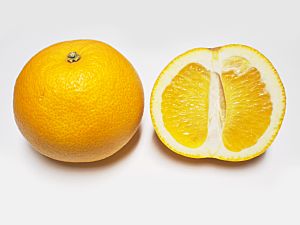Hassaku orange facts for kids
Quick facts for kids Hassaku orange |
|
|---|---|
 |
|
| Hassaku, whole and sectioned | |
| Scientific classification | |
| Kingdom: | |
| (unranked): | |
| (unranked): | |
| (unranked): | |
| Order: | |
| Family: | |
| Subfamily: |
Aurantioideae
|
| Tribe: |
Citreae
|
| Genus: | |
| Species: |
C. × hassaku
|
| Binomial name | |
| Citrus × hassaku Hort. Tanaka
|
|
The Hassaku orange (Japanese: 八朔) is a special type of Japanese citrus fruit. It's a hybrid fruit, which means it's a mix of two different citrus plants. It looks like an orange in color but is as big as a grapefruit.
This unique fruit was first found near the Jōdo Temple in Inno-shima, a place in Hiroshima Prefecture, Japan.
Contents
Growing and Using Hassaku Oranges
How People Eat Hassaku
People in Japan often eat the Hassaku orange just like a regular orange. However, it can be a bit tart! Some people use a grapefruit spoon to scoop out the fruit. This helps them avoid the bitter white part under the peel, called the albedo. Even though it's tart, it still has a nice sweetness. When you bite into a slice, juice bursts into your mouth, which many people find very refreshing.
Where Hassaku Oranges Grow
In 2010, Japan harvested about 35,919 tons of Hassaku oranges. A large part of this, about 68%, came from Wakayama Prefecture. Other areas where Hassaku oranges are grown include Hiroshima, Ehime, and Tokushima Prefecture.
Hassaku in the Kitchen and for Health
Most people enjoy Hassaku oranges raw. If you cook them, they tend to become more bitter. The fruit is a great source of important nutrients. It's packed with vitamin C, which helps your body stay healthy. It also has folic acid, potassium, and lots of fiber, which is good for digestion.
Protecting Hassaku Trees
Sometimes, Hassaku trees can get sick. A disease called Citrus tristeza virus can infect them. This virus makes the trees stop growing well and can even destroy the harvest after about 10 to 15 years. Scientists and farmers work to protect these trees from such diseases.
Hassaku for Skin Care
Did you know that parts of the young Hassaku fruit have been used in medicine? Extracts from these fruits have been used in skin care treatments. They can help people who have skin conditions like atopic dermatitis.
Fun Facts About Hassaku
Hassa-kun: The Friendly Mascot
In Inno-shima, Hiroshima prefecture, there's a fun local mascot character named Hassa-kun! This mascot helps to promote the area and encourage tourism. It's a friendly way to represent the region where the Hassaku orange was first discovered.
 | Leon Lynch |
 | Milton P. Webster |
 | Ferdinand Smith |

